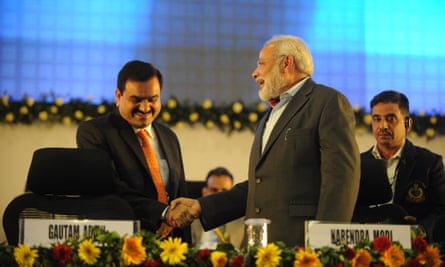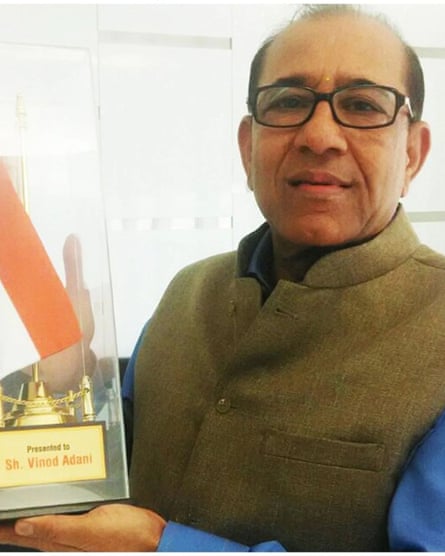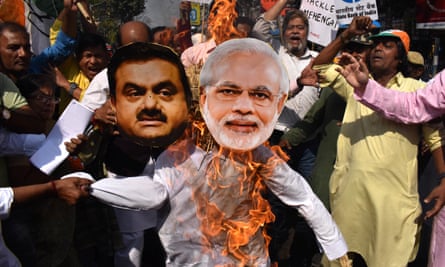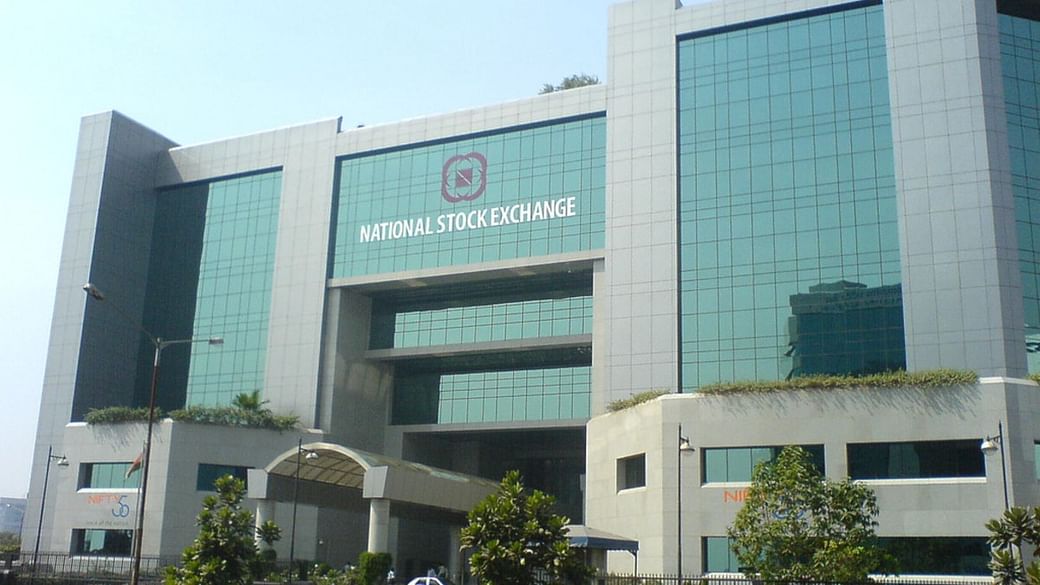'People will forgive you for being wrong, but they will never forgive you for being right - especially if events prove you right while proving them wrong.' Thomas Sowell
Search This Blog
Wednesday, 14 August 2024
Thursday, 31 August 2023
Modi-linked Adani family secretly invested in own shares, documents suggest
Hannah Ellis-Petersen in Delhi and Simon Goodley in London in The Guardian
A billionaire Indian family with close ties to the country’s prime minister, Narendra Modi, secretly invested hundreds of millions of dollars into the Indian stock market, buying its own shares, newly disclosed documents suggest.
According to offshore financial records seen by the Guardian, associates of the Adani family may have spent years discreetly acquiring stock in the Adani Group’s own companies during its meteoric rise to become one of India’s largest and most powerful businesses.
By 2022, its founder, Gautam Adani, had become India’s richest person and the world’s third richest person, worth more than $120bn (£94bn).
In January, a report published by the New York financial research firm Hindenburg accused the Adani Group of pulling off the “largest con in corporate history”.
It alleged there had been “brazen stock manipulation and accounting fraud”, and the use of opaque offshore companies to buy its own shares, contributing to the “sky high” market valuation of the conglomerate, which hit a peak of $288bn in 2022.
The Adani Group denied the Hindenburg claims, which initially wiped $100bn off the conglomerate’s market value and cost Gautam Adani his prime spot on the world rich list.
At the time, the group called the research a “calculated attack on India” and on “the independence, integrity and quality of Indian institutions”.
Yet new documents obtained by the Organised Crime and Corruption Reporting Project (OCCRP), and shared with the Guardian and the Financial Times, reveal for the first time the details of an undisclosed and complex offshore operation in Mauritius – seemingly controlled by Adani associates – that was allegedly used to support the share prices of its group of companies from 2013 to 2018.
Up until now, this offshore network had remained impenetrable.
The records also appear to provide compelling evidence of the influential role allegedly played by Adani’s older brother, Vinod, in the secretive offshore operations. The Adani Group says Vinod Adani has “no role in the day to day affairs” of the company.
In the documents, two of Vinod Adani’s close associates are named as sole beneficiaries of offshore companies through which the money appeared to flow. In addition, financial records and interviews suggest investments into Adani stock from two Mauritius-based funds were overseen by a Dubai-based company, run by a known employee of Vinod Adani.
The disclosure could have significant political implications for Modi, whose relationship with Gautam Adani goes back 20 years.

Since the Hindenburg report was published, Modi has faced difficult questions about the nature of his partnership with Gautam Adani and allegations of preferential treatment of the Adani Group by his government.
According to a letter uncovered by the OCCRP and seen by the Guardian, the Securities and Exchange Board of India (SEBI) had been handed evidence in early 2014 of alleged suspicious stock market activity by the Adani Group – but after Modi was elected months later, the government regulator’s interest seemed to lapse.
In response to fresh questions relating to the new documents, the Adani Group said: “Contrary to your claim of new evidence/proofs, these are nothing, but a rehash of unsubstantiated allegations levelled in the Hindenburg report. Our response to the Hindenburg report is available on our website. Suffice it to state that there is neither any truth to nor any basis for making any of the said allegations against the Adani Group and its promoters and we expressly reject all of them.”
The offshore money trail
The trove of documents lays out a complex web of companies that date back to 2010, when two Adani family associates, Chang Chung-Ling and Nasser Ali Shaban Ahli, began setting up offshore shell companies in Mauritius, the British Virgin Islands and the United Arab Emirates.
These financial records appear to show that four of the offshore companies established by Chang and Ahli – who have both been directors of Adani-linked companies – sent hundreds of millions of dollars into a large investment fund in Bermuda called Global Opportunities Fund (GOF), with those monies invested in the Indian stock market from 2013 onwards.
This investment was made by introducing yet another layer of opacity. Financial records paint a picture of money from the pair’s offshore companies flowing from GOF into two funds to which GOF subscribed: Emerging India Focus Funds (EIFF) and EM Resurgent Fund (EMRF).
These funds then appear to have spent years acquiring shares in four Adani-listed companies: Adani Enterprises, Adani Ports and Special Economic Zone, Adani Power and, later, Adani Transmission. The records shine a light on how money in opaque offshore structures can flow secretly into the shares of publicly listed companies in India.

The investment decisions of these two funds appeared to be made under the guidance of an investment advisory company controlled by a known employee and associate of Vinod Adani, based in Dubai.
In May 2014, EIFF appears to have held more than $190m of shares in three Adani entities, while EMRF looks to have invested around two-thirds of its portfolio in about $70m of Adani stock. Both funds appear to have used money that came solely from the companies controlled by Chang and Ahli.
In September 2014, a separate set of financial records set out how the four Chang and Ahli offshore companies had invested about $260m in Adani shares via this structure.
Documents show that this investment appeared to grow over the next three years: by March 2017, the Chang and Ahli offshore companies had invested $430m – 100% of their total portfolio – into Adani company stock.
When contacted by the Guardian by phone, Chang declined to discuss the documents setting out his company’s investments in Adani shares. Nor would he answer questions about his links to Vinod Adani, who along with Ahli did not respond to efforts to contact them.
Indian stock market rules
The alleged offshore enterprise of the Adani associates raises questions about the possible breaching of Indian market rules that prevent stock manipulation and regulate public shareholdings of companies.
The rules state that 25% of a company’s shares must be kept “free float” – meaning they are available for public trade on the stock exchange – while 75% can be held by promoters, who have declared their direct involvement or connection with the company. Vinod Adani has recently been acknowledged by the conglomerate as a promoter.
However, records show that at the peak of their investment, Ahli and Chang held between 8% and 13.5% of the free floating shares of four Adani companies through EIFF and EMRF. If their holdings were classified as being controlled by Vinod Adani proxies, the Adani Group’s promoter holdings would have seemingly breached the 75% limit.
Political ties
Gautam Adani has long been accused of benefiting from his powerful political connections. His relationship with Modi dates back to 2002, when he was a businessman in Gujarat and Modi was chief minister of the state, and their rise has appeared to happen in tandem since. After Modi won the general election in May 2014, he flew to Delhi on Gautam Adani’s plane, a scene captured in a now well-known photo of him in front of the Adani corporate logo.
During Modi’s time as leader, the power and influence of the Adani Group has soared, with the conglomerate acquiring lucrative state contracts for ports, power plants, electricity, coalmines, highways, energy parks, slum redevelopment and airports. In some cases, laws were amended that allowed Adani Group companies to expand in sectors such as airports and coal. In turn, the stock value of the Adani Group rose from about $8bn in 2013 to $288bn by September 2022.
Adani has repeatedly denied that his longstanding connection with the prime minister has led to preferential treatment, as has the Indian government.
Yet a document unearthed by the OCCRP and seen by the Guardian suggests the SEBI, the government regulator now in charge of investigating the Adani Group, was made aware of stock market activity using Adani offshore funds as far back as early 2014.
In a letter dated January 2014, Najib Shah, the then head of the Directorate of Revenue Intelligence (DRI), India’s financial law enforcement agency, wrote to Upendra Kumar Sinha, the then head of the SEBI.
“There are indications that [Adani-linked] money may have found its way to stock markets in India as investment and disinvestment in the Adani Group,” Shah said in the letter.
He noted that he had sent this material to Sinha because the SEBI was “understood to be investigating into the dealings of the Adani Group of companies in the stock market”.
However, a few months later, after Modi was elected in May 2014, the SEBI’s apparent interest seemed to disappear, a source working for the regulator at the time said.
The SEBI has never publicly disclosed the warning given by the DRI, nor any investigation it might have conducted into the Adani Group in 2014. The letter appears to misalign with statements made by the SEBI in recent court filings in which it denied there were investigations into the Adani Group before 2020, as well as saying suggestions it had investigated the Adani Group dating back to 2016 were “factually baseless”.
The ability of the SEBI, a regulator under the purview of the Modi government, to independently investigate the Adani Group has recently been called into question by critics, lawyers and the political opposition.

According to a report given in May to the supreme court – which set up an expert committee to investigate the Adani Group after the publication of the Hindenburg report – the SEBI had been investigating 13 offshore investors in the conglomerate since 2020 but had “hit a wall” in trying to establish if they were linked to the Adani Group. Two of the entities under investigation are EIFF and EMRF.
The regulator has been accused of dragging its feet in their investigation into possible violations by the Adani Group, seeking several extensions. On Friday, the SEBI submitted a report to the supreme court stating that their investigations were in the final stages but did not reveal any findings.
The Adani Group said: “The provocative nature of the story and the proposed timing of its publication, when the allegations in it are entirely based on matters which are already under a formal investigation by SEBI and is at the verge of finalisation of the report and while the honourable supreme court hearing is also scheduled shortly; makes us believe that the proposed publication is being done wilfully to defame, disparage, erode value of and cause loss to the Adani Group and its stakeholders.
“Further, it is categorically stated that all the Adani Group’s publicly listed entities are in compliance with all applicable laws, including the regulation relating to public share holdings and PMLA [Prevention of Money Laundering Act].”
A spokesperson for the two funds that invested in Adani stocks – EIFF and EMRF – said the funds had not been “involved in any wrongdoing generally and particularly in connection with the Adani Group”.
It added: “Both the funds had multiple investments across asset classes like equities, mutual funds, alternate investment funds, bonds etc. Amongst these, EIFF and EMRF had investment in equities of the Adani Group, apart from other investments. EIFF and EMRF received subscriptions from Global Opportunities Fund Limited (GOF) which was a broad-based fund as per declarations received. GOF fully redeemed all its participation in EIFF in March 2019 and EMRF in March 2020.”
The SEBI did not respond to requests for comment.
Saturday, 20 May 2023
Saturday, 4 February 2023
Saturday, 19 February 2022
Tuesday, 15 February 2022
Incredible story of how a faceless yogi ‘conned’ NSE CEO, got 9x salary, 3-day week, promotions
Shubham Batra in The Print

New Delhi: The chief executive of a top stock exchange which handles 49 crore transactions per day — worth a daily average turnover of Rs 64,000 crore — seeks the “guidance” of a faceless yogi to better perform her job. All over email without having ever met him.
This ‘yogi’ also gets a little-known employee of a public sector company hired as the chief strategy officer (CSO) of the stock exchange, a position that didn’t exist earlier, at an annual salary package of Rs 1.38 crore, more than nine times his previous package of Rs 15 lakh.
The ‘yogi’ gets the CEO to promote the CSO year after year to make him the group operating officer (GOO), even exempt him from the five-day work-week, allow him to come in only for three days and work the rest of the time at will.
That’s not all.
The CEO shares sensitive business information related to the stock exchange’s financial projections for five years, dividend pay-out ratio, business plans, agenda of board meeting and consultations over the ratings/performance appraisals of employees.
Eventually, a probe by the stock exchange which consulted “practitioners of human psychology” strongly suspects the CSO was himself the faceless ‘yogi’ and had created that fake identity to con the CEO and benefit from it.
It’s a shockingly bizarre ‘con job’ and even funny at one level, if it was the plot of a movie or a TV series.
Except this is no fiction, and is alleged to have happened for real at the National Stock Exchange, India’s top share exchange whose stated aim is to “catalyse India’s growth story by creating investment opportunities, enabling access and empowering our stakeholders”.
The CEO in question is Chitra Ramakrishna and the CSO she hired and then promoted is Anand Subramanian — who is also alleged to have doubled up as the ‘yogi’. Between 2013 and 2016, when Ramakrishna was NSE chief, she took business decisions on the advice of this ‘yogi’ and shared sensitive and confidential information about business matters with him.
The revelations came as part of a six-year probe that markets regulator Securities and Exchange Board of India (SEBI) undertook on complaints over misgovernance and wrongdoings at the NSE. In an order Friday, the regulator fined Ramakrishna and Subramanian Rs 3 crore and Rs 2 crore, respectively.
While SEBI maintained that allegations of Subramanian being the ‘yogi’ himself aren’t sustainable, the regulator in its order said the ex-GOO is surely an accomplice in the wrongdoings at the exchange.
In her submissions to SEBI on whether sharing such information is against the principles of governance, Ramakrishna said: “As we know, senior leaders often seek informal counsel from coaches, mentors or other seniors in this industry which are all purely informal in nature. In a similar strain, I felt that this guidance would help me perform my role better.”
Also read: LIC IPO is a delicate business & raises troubling questions
What happened at NSE
According to the 190-page SEBI order issued Friday, NSE CEO and MD Chitra Ramakrishna hired Anand Subramanian as the bourse’s CSO in 2013 at a remuneration package of Rs 1.38 crore, over nine times his previous compensation of Rs 15 lakh at state-owned Balmer Lawrie.
The position of a CSO didn’t even exist before Subramanian’s appointment, but he didn’t have the required qualifications for such a position.
Over a period of three years, Ramakrishna kept on promoting him, eventually making him GOO. She even exempted him from working five days a week and instead asked to come only for three days and be allowed to work the rest of the time at will.
All of these decisions were made on the instructions of a faceless ‘yogi’, who goes by the name ‘Siddha Purusha’, according to Ramakrishna’s submissions.
She said the ‘yogi’ doesn’t possess a physical persona and can materialise at will, adding that he is a spiritual force that dwells in the Himalayas. She sent emails to an ID, rigyajursama@outlook.com, sharing sensitive and confidential information about NSE, the SEBI order showed.
While she was going about making such decisions, between 2013 and 2016, several complaints were made with SEBI to allege governance issues in the appointment of Subramanian, who was also advisor to Ramakrishna.
The SEBI then began a probe, seeking evidence and depositions from the key characters, including Ramakrishna.
Also read: 5 years, 28 banks, Rs 23,000 cr debt — how ABG Shipyard pulled off ‘India’s biggest bank fraud’
Subramanian was ‘yogi’, claims NSE
In a 2018 letter to SEBI, the NSE submitted that “its legal advisers had consulted practitioners of human psychology and according to the opinion of these practitioners, Ramakrishna has been exploited by Subramanian by creating another identity in the form of Rigyajursama to guide her to perform her duties according to his wish”.
“Ramakrishna was manipulated by the same man in the form of different identities; one as Subramanian who enjoyed her trust and other as Rigyajursama who had her devotion and dependence,” it had added.
The NSE claimed that the email ID named above, in fact, belonged to Subramanian. The claim was based on the fact that Subramanian also knew this ‘unknown person’ for 22 years. Moreover, he was party to all the email interactions between the CEO and the ‘yogi’.
The SEBI order attached several emails in its order, including one in which the ‘yogi’ instructed Ramakrishna to exempt Subramanian from five-day weeks.
Another email instructed Ramakrishna: “SOM, if I had the opportunity to be a person on Earth then Kanchan is the perfect fit. Ashirvadhams.”
Ramakrishna responded: “SIRONMANI, struggle is I have always seen THEE through G, and challenged myself to on my own realise the difference.”
‘SOM’ refers to Ramakrishna, and ‘Kanchan’ and ‘G’ to Subramanian, the regulator said in its order.
According to the order: “Ramakrishna in the emails sent to the unknown person shared information pertaining to NSE’s financial projections for five years, dividend pay-out ratio, business plans, agenda of NSE’s board meeting and consultations over the ratings/performance appraisals of NSE employees.”
Some of the other emails under investigation revealed that the unknown ‘yogi’ had been interacting with Ramakrishna regularly even on operational issues regarding senior NSE employees.
NSE’s other troubles
This isn’t the first time that NSE has been accused of lapses in corporate governance.
In 2017, when the exchange wanted to launch an initial public offering, allegations surfaced that its officials had provided some high-frequency traders unfair access through colocation servers, which could speed up algorithmic trading, giving unfair advantage to these traders over others.
Anand Narayan, who specialises in securities laws and works as an in-house counsel at a major private firm, told ThePrint that “SEBI’s order against NSE and its senior officials shows massive misgovernance issues in one of India’s leading stock exchanges”.
“NSE may like to challenge the order before Securities Appellate Tribunal. However, SEBI has yet again shown its firm intention to protect the interest of investors by acting against NSE,” Narayan said.
Saturday, 8 March 2014
A Primer on Sahara
- Sahara group only paid the first tranche of Rs 5,120 crore and defaulted in giving back the remaining amount. But they claimed in December 2012 that they had already paid off the investors Rs 22,885 crore. That is repayment within 4 months—in cash!
- The source of these 22885 crore—all cash—is a mystery that they wouldn't disclose even to the Supreme Court.
- If we add the accumulated interest, the total repayment from SAHARA would be 37000 crores.
- Earlier, they had claimed the deposits with them as private placement from 3.07 crores of friends, families, associates and employees! They first claimed that no general public was involved at all.
- Even before the SEBI case, when they first came under the RBI scanner, Sahara companies claimed to be dealing with small amounts deposited by millions of depositors. When the RBI revised the rules for Residual Non Banking Companies (RNBCs) and sought to control its para banking activities, Sahara claimed to haverepaid Rs 73000 crore, four years before maturity, and announced the same through ads. SEBI came into the picture when a Sahara group company filed a prospectus to go for a public issue of shares and the details included deposits raised by two other Sahara Companies.
- After the Supreme Court passed the order, Subrata Roy Sahara, in a full page ad, challenged SEBI for a national TV debate, to settle the matter!
- When the SEBI order was passed, depository accounts in India totalled 15 million. The largest company in India today has 4 million investors. Sahara claimed to have 30.7 million!
- The latest ad by Sahara talks about 80 million investors. India has about 250 million households. A third of India is below poverty line. That means every second household in India would be a Sahara investor.
- Based on investors details submitted by Sahara, SEBI sent out 21000 letters:
- Only 280 responded.
- 7000 letters were returned with addressee not found.
- The list of investors submitted to SEBI, on a cursory examination, included:
- 5984 Kalawatis
- 55 Kalawatis at the same address
- A Kalawati having the same address as a Mairunnissa, another investor
- A Kalawati being paid back on the same day multiple times
- 1433 Anirudh Singhs, all of them S/ O Hukum Singh
- One depositor's name was Haridwar.
- An address was Jaipur, Nagpur, Maharashtra.
- Another address was Aurangabad, Lucknow, UP.
- There are numerous instances of:
- one person having multiple accounts
- one account having multiple beneficiaries
- one person with multiple addresses
- one address having multiple investors.
- People whose claimed dues spread over multiple accounts running into crores.
- Many depositors addresses are untraceable,
- There were cases having addresses like national highways, and just names of villages with no specific house number etc.
- In SC, Saharas deposited a title deed of a 106 acre plot in Versova and claimed its worth at Rs.19300 Crores!! SEBI says it is not worth a penny, because it is in a mangrove and in a no construction zone.
- Sahara claims to employ 12 lakh employees. Applying the minimum Act Including PF, ESI, Bonus etc, the cost is 12500 per month. If i were to take different scales, the average would be 25000/month. That would be 36,000 Crores p.a of salaries alone!
- And the PF dues on such salaries would be about 5000 crores/annum. EPFO did ask for the details as they scarcely match with their records and Saharas go to Lucknow High Court and start another 'merry go round'.
- In an ad recently, they declared a 60% increment across the board. Wouldn't you love to work with them? As Rajnikanth would have said ''Any doubt'?